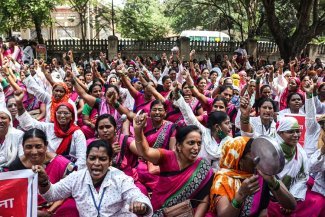
Demonstrators from the National Campaign for the Right to Legal, Safe and Free Abortion, in Buenos Aires.
In Latin America, clandestine abortions, performed in unsafe and unsanitary conditions, are responsible for at least 12 per cent of maternal deaths. But women continue and will continue to abort, despite the risks, which is why women’s movements are calling for sex education to enable women and girls to decide, contraceptives to prevent abortion and legal abortion to stop the deaths. They are still, however, coming up against social conservatism, opposition from the most influential churches in the region and a lack of political will.
Only Uruguay, Cuba, Puerto Rico and French Guiana have laws allowing women to abort freely. The rest of the countries in the region vary between absolute prohibition (Chile, El Salvador, Haiti, Honduras, Dominican Republic and Suriname) and restrictive legislation that only usually permits abortion in cases of rape, risk to the mother’s life or if the foetus is unviable. The result is that 95 per cent of the 4.4 million Latin American women who had abortions in 2008 did so in unsafe conditions, and over a thousand of them died, according to Facts on Abortion in Latin America and the Caribbean, a study published by US research organisation the Guttmacher Institute.
Chile is an extreme example: its law, passed during the Pinochet dictatorship, establishes that abortion, under any circumstances, is a “crime against family order and public morality”.
Paraguay, for its part, has one of the highest levels of teen pregnancies and infant mortality. The recent case of a ten-year-old girl, who gave birth after allegedly being raped by her stepfather, has drawn attention to the country’s highly restrictive legislation, under which abortions can only be performed if the mother’s life is in imminent danger.
Save in the case of Uruguay, which passed a law during the Mujica presidency allowing women to abort within established time limits, no progress has been made on this issue in the countries with so-called progressive governments. In Evo Morales’ Bolivia, for example, those bringing about “the death of a human being in gestation” continue to face prison sentences of between two and six years. Meanwhile, Rafael Correa of Equador went as far as to threaten to resign if abortion were decriminalised.
A huge class bias runs through this debate. “Let’s not kid ourselves, the girls who die from clandestine abortions are the poor ones; white middle class women pay for a safe abortion, and that’s that,” says Argentine academic and activist Verónica Gago. She adds that poor, Afro-descendant and indigenous women are also more likely to go to prison for having an illegal abortion.
The “conscientious objection” barrier
In some instances, the legislation is ahead of social practice: “In spite of the legal framework, the actual situation in Argentina is very close to legal contexts where abortion is total prohibited,” denounces Mariela Belski, executive director of Amnesty International (AI) Argentina.
“The abusive and arbitrary use of conscientious objection constitutes an illegitimate barrier to legal abortion services,” she adds. Women and girls also face obstacles such as “disapproving comments from hospital staff or health providers and public servants acting in bad faith, breaches of professional secrecy and the Church’s influence on governments,” says the executive director of AI.
Between 460,000 and 600,000 abortions are performed every year in Argentina, according to the figures of the Health Ministry. Between 2007 and 2011, 23 per cent of maternal deaths were caused by unsafe abortions.
This social conservatism contrasts sharply with the strength of the women’s movement in Argentina. Every year, the National Campaign for the Right to Legal, Safe and Free Abortion presents a bill before Congress to replace the current legislation that dates back to 1921 and which provided for abortions in the event of risk to mother’s life or the rape of a “demented or idiotic” woman. This shocking wording was rectified in 2012 by a Supreme Court decision, following which access to abortion was extended to any woman who has been raped.
The influence of the Catholic and Evangelical church
The feminist movement’s struggle to secure any gains in terms of abortion rights is largely owed to the influence of the Catholic (and more recently the Evangelical) church in the region. “Pope Francis represents an effort to revive the church in Latin America. We have lost the ability to articulate what is secular and popular,” says Verónica Gago. In 2016, the Pope gave priests the power to grant absolution for the sin of abortion, although it continues to be considered a “grave sin, since it puts an end to an innocent life”.
For the feminist movement, the Catholic church is an institution that has been central to the oppression of women and, in particular, the control they have over their bodies, their sexuality and reproduction. As a result, it has become controversially customary for feminist demonstrators to end their marches in front of cathedrals, where they often face altercations and police repression. Whilst the conservative press tags feminist activists as violent and radical, the women argue that the real violence, the violence that rapes and kills, is the violence perpetrated against women.
The Catholic church has been relentless in its opposition to any attempts to relax legislation that restricts abortion. In 2009, for example, the Brazilian state, which authorises abortion in cases of rape and risk to the life of the mother, clashed with the Catholic church when Archbishop José Cardoso Sobrinho excommunicated the mother and the doctors who terminated the pregnancy of a nine-year-old girl who was raped by her stepfather.
But it is not only the Catholic church: “The Evangelical churches are even more blatant in their desire to meddle in politics. I find the influence they are gaining in countries like Colombia and Brazil profoundly disturbing,” warns the Argentine sociologist and feminist Alejandra Oberti. In Brazil, the so-called Evangelical bench is becoming ever more influential in Congress and has played a key role in the conservative turn taken in the country. At the end of 2015, Brazil passed a law enabling the Catholic and Evangelical churches to turn to the Supreme Court to contest laws that “directly or indirectly interfere in the religious system or religious worship”.
In Colombia, the Evangelical churches had a significant influence on the outcome of the referendum through which Colombians said “no” to the peace agreement with the FARC (Revolutionary Armed Forces of Colombia).
Evangelical pastors even called for a “no” vote from the pulpit, arguing that the agreement was tainted with “gender ideology”, which, among other things, would lead to the legalisation of abortion, despite the word “abortion” not featuring anywhere in the peace agreement.
Support network
Women are organising and self-managing in response to this hostile environment. In 2012, Argentinian women, taking inspiration from an idea developed in Italy, set up the self-managed Socorristas en Red (Women Rescuers Network), aimed at “supporting and informing” women who are considering having an abortion and “de-clandestinising” the procedure, as Romina, one of the network’s activists in Buenos Aires, explains.
The rescue workers provide a free helpline and meet with women contemplating abortion to provide them with information and, should they decide to terminate the pregnancy, to help them acquire the medication most widely used to perform a safe abortion, Misoprostol.
In addition to preventing unsafe procedures, the aim is also to “de-dramatize” abortion. “There is clear evidence that post-abortion trauma can be avoided if it is conducted in a safe and informed manner,” says Romina. She also suggests that women taking the decision should be able to do so surrounded by friends, underlining the “freedom of the decision”. In 2015, the network assisted 2,894 women who decided to abort.
In 2011, a similar initiative emerged in Venezuela, RIAS (Information Network for Safe Abortion). It is also a free and self-managed service run by women providing information on terminating a pregnancy with pills. As the Rescuers point out: “Women have always aborted and always will. It’s a question of bringing an end to the suffering, and the deaths.”









